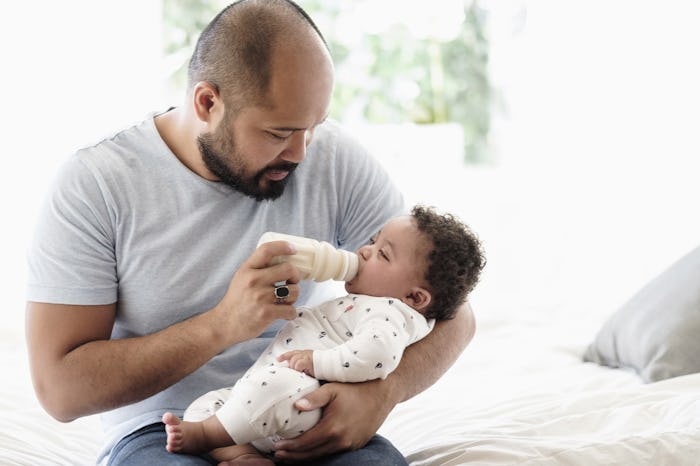Life

5 Scientific Facts That Will Help You See The Good Side Of Supplementing
The debate between breastfeeding and formula feeding is a huge one in the mommy wars, despite the world's best efforts to remind people that a fed baby is the best kind of baby, regardless of how you get there. But for moms who are pulling double duty, both supplementing and breastfeeding, the war can be even harder. People insist they aren't trying hard enough, they're being lazy, and eventually that gets to a mom's head. But if you know some scientific facts that will help you see the good side of supplementing, you can banish those negative thoughts.
No matter why you have to supplement — whether it's because your baby was losing weight or because you needed help as you increased your breast milk supply — it's important to remember that you're doing the best possible thing you can for your baby. If your heart was set on exclusively breastfeeding but you needed some help, keep reminding yourself that you're putting your baby's health above your wishes and desires. If you weren't sure about breastfeeding but are now doing both so you can make sure your baby gets the nutrients they need while still having enough to eat, remind yourself that you aren't being selfish.
It's all about perspective, but science helps. These five scientific facts will help you see the good side of supplementing, proving that all of those dirty bottles and breast pads are worth the effort.
1Supplementing Allows You To Breastfeed Longer Than If You Were Only Nursing
Despite the argument that "breast is best" and introducing a bottle can cause nipple confusion or make babies "lazy" at the breast, a study published in Pediatrics concluded that early supplementing may actually increase the duration of your breastfeeding journey. The study included two control groups — a group of babies who were given early supplementation while being breastfed and a group of babies who were exclusively breastfed with no supplementation. At 3 months old, the researchers discovered that 79 percent of the babies that received supplementation were now exclusively breastfeeding, while only 42 percent of babies who received no supplements were exclusively breastfed. Whether it's because it gives moms a chance to get used to the breastfeeding journey or because it's not overwhelming, no one's sure, but the numbers are there to support early supplementation as a way to eventually have an exclusive breastfeeding journey.
2It Can Make Your Baby More Receptive To Breastfeeding
Lactation consultant Wendy Wisner noted on her website that supplementing can actually save breastfeeding by making your baby more receptive to the idea. She suggested that when doctors and health care professionals suggest that the only way to feed a baby is to increase supply and demand while breastfeeding, they aren't taking into consideration the fact that a hungry, underfed baby won't breastfeed well. They attempt to conserve their energy which makes them lethargic and sleepy on the breast according to Wisner. Instead of pushing them to breastfeed, even though they are hungry, it can help to supplement so they are not starving when they are attempting to latch.
3It Can Get Your Baby's Weight Up To Where It Needs To Be
The same study in Pediatrics that found early supplementation could help you manage breastfeeding exclusively also determined that early limited formula may be a successful, temporary solution to help breastfeeding infants that have lost weight.
4It Offers Nutrients Exclusively Breastfed Babies May Need Supplements For
According to Enfamil, the argument that formula lacks complete nutrition is not true. In fact, supplementing with formula means your baby may be receiving some of the nutrients that breastfed babies often need supplements for, like vitamin D.
5You Can Still Bond With Your Baby During Bottle Times
A lot of moms worry that supplementing is going to take away from the bonding that breastfeeding offers, but this isn't true. What to Expect noted that you can still bond and cuddle with your baby during a feeding, even if you're using a bottle instead of your breast.